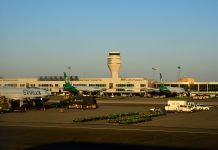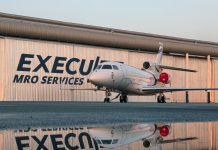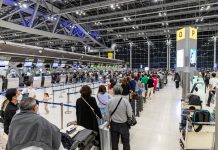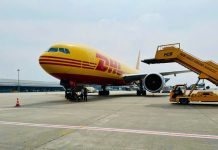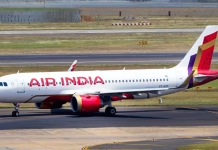 Korean Air will construct a new aircraft maintenance hangar within Incheon International Airport’s High Tech Aviation Complex, supported by a KRW 176 billion joint investment in partnership with Incheon International Airport Corporation (IIAC).
Korean Air will construct a new aircraft maintenance hangar within Incheon International Airport’s High Tech Aviation Complex, supported by a KRW 176 billion joint investment in partnership with Incheon International Airport Corporation (IIAC).
Korean Air and IIAC signed an agreement for the H3 Maintenance Facility Development Project at the Grand Hyatt Incheon. The event was attended by Keehong Woo, Vice Chairman of Korean Air; Hak-jae Lee, President & CEO of IIAC; and more than 90 representatives from government, local authorities, and the National Assembly.
The project will create a next-generation maintenance facility capable of airframe inspections, component checks, and complex heavy maintenance and modification work. As Korean Air prepares for the launch of the integrated carrier, the new hangar will play a key role in expanding its MRO capabilities and developing a world-class maintenance hub at Incheon’s High Tech Aviation Complex.
“A maintenance hangar is not merely a building; it is a cradle of safety and a vital foundation for upholding Korean Air’s top priority of absolute safety,” said Vice Chairman Woo in his remarks. “From the earliest design phase, we will ensure this new hangar becomes the safest, most advanced, and most exemplary maintenance base—a true stronghold of aviation safety.”
Built on a 69,299-square-meter site, the hangar will be capable of accommodating two widebody aircraft and one narrowbody aircraft at the same time. Construction is scheduled to begin in 2027, with operations targeted for late 2029. Approximately 300 personnel, including Korean Air’s expert maintenance workforce, will be based at the facility, which will serve as a major center for heavy maintenance and aircraft modification.
The project will allow Korean Air to further strengthen its world-class maintenance expertise and operational capabilities following the launch of the integrated carrier. With upgraded enhanced infrastructure and expanded capacity, the airline is well positioned to grow as a premier global MRO hub, driving the advancement and global competitiveness of Korea’s aviation maintenance, repair and overhaul (MRO) sector.
“We will work closely with Incheon International Airport Corporation to ensure the seamless and timely progress of the project,” said a Korean Air representative. “Guided by our Safety First principle, Korean Air will continue to drive innovation and transformation as we move toward becoming the world’s most beloved airline.”
In addition to the new hangar, Korean Air is advancing major infrastructure projects in preparation for the integrated carrier, including a KRW 578 billion project to build Asia’s largest engine maintenance facility on Yeongjong Island in Incheon, and a KRW 1.2 trillion Future Urban Air Mobility (UAM) & Aviation Safety R&D Center in Bucheon, Gyeonggi Province.
Korean Air introduces new sustainable in-flight meal containers
Korean Air is upgrading the in-flight meal containers it has used for the past two decades with new, sustainable, plant-based alternatives. Beginning in December, the airline will gradually introduce entrée containers made from non-wood pulp derived from materials such as straw, sugarcane and bamboo. The initiative supports Korean Air’s efforts to reduce plastic use and contribute to global carbon-reduction goals. Following initial rollout on select routes this December, the airline plans to expand the new containers across its entire network by the end of 2026. The new containers will be used for main entrées offered on board, particularly Korean and Western meals in economy class.
Made from plant-based pulp that does not require cutting down trees, the containers offer an eco-friendly alternative to traditional plastic and paper products. They also provide strong heat resistance and durability, maintaining their shape during extended exposure to high temperatures. Korean Air expects the transition to reduce related carbon emissions by approximately 60 percent.
“This transition to new in-flight meal containers is an essential long-term investment in environmental protection and sustainable operations,” said a Korean Air representative. “We remain committed to advancing our sustainability initiatives, aligning with global decarbonisation trends in aviation, and delivering greater value to our customers.”







